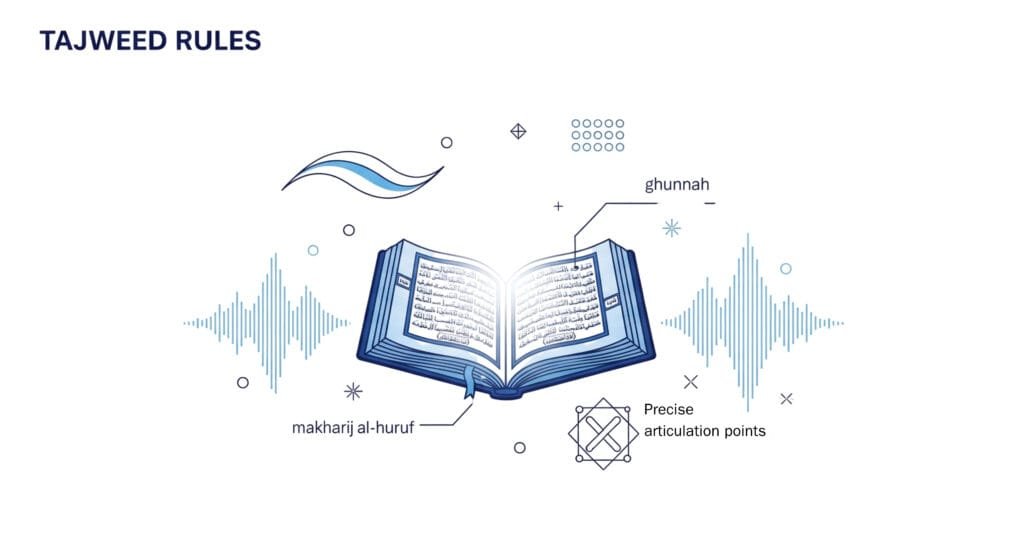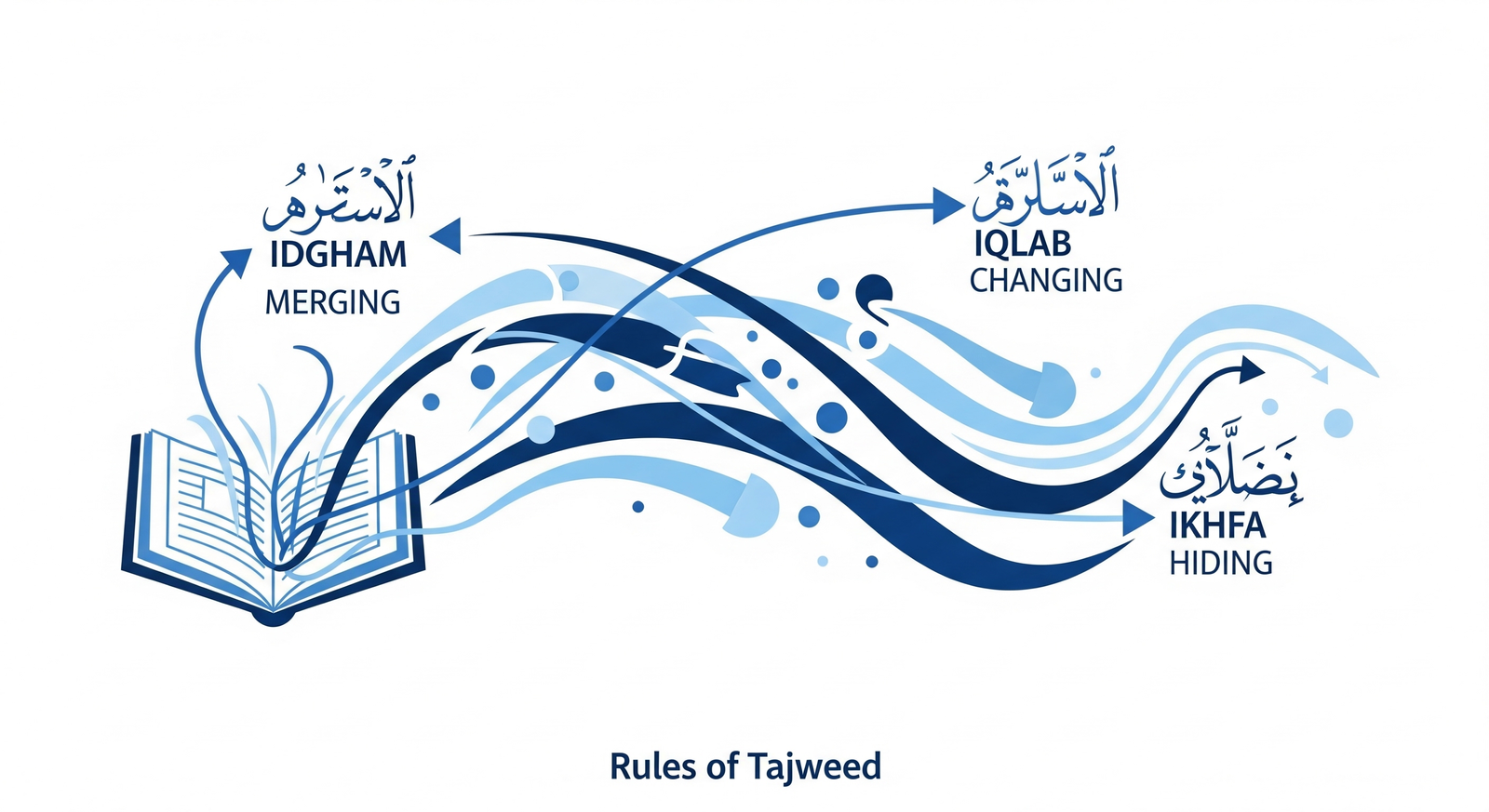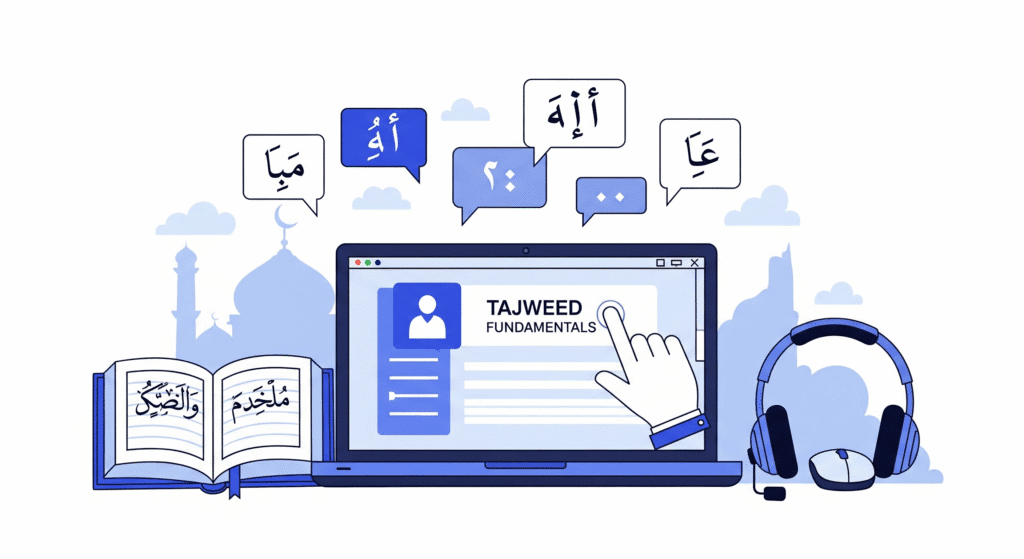Starting With The Name Of Almighty Allah Ever
The Quran, the sacred book of Islam, is more than a collection of verses. It is the divine word of Allah, meant to be recited with precision, reverence, and beauty. This is where Tajweed, the art and science of Quranic recitation, becomes essential. Derived from the Arabic word “jawwada,” meaning to improve or beautify, Tajweed refers to the rules that govern the correct pronunciation, articulation, and intonation of each letter and word in the Quran, as it was revealed to the Prophet Muhammad (peace be upon him). For anding Tajweed in Quranic RecitMuslims, reciting the Quran with Tajweed is not just about enhancing the sound but about preserving the integrity of its divine message and deepening their spiritual connection.
In this comprehensive guide, we explore Understanding Tajweed in Quranic Recitation, why it holds such profound importance, the key rules involved, how to learn it effectively, and the challenges one might face. We’ll also highlight the transformative effects of this practice, supported by Quranic verses and Ahadees, to inspire you to embark on this rewarding journey. Whether you’re a beginner or seeking to refine your recitation, understanding Tajweed’s purpose can transform your relationship with the Quran.
Understanding Tajweed in Quranic Recitation
Tajweed is the set of rules that ensures the Quran is recited with proper pronunciation, giving each letter its due articulation point (Makhraj) and characteristics (Sifaat). Mastering the precise pronunciation of the Quran requires a solid grasp of Makhraj, the articulation points for each Arabic letter. For a detailed explanation, see our blog post “What Is Makhraj In Tajweed?”. The term “Tajweed” comes from the Arabic root “jawwada,” meaning to make something excellent or beautiful. In the context of the Quran, it involves reciting the verses in a slow, measured, and melodious tone, as they were revealed to the Prophet Muhammad (peace be upon him) by the Angel Gabriel A.S.

The science of Tajweed emerged during the early Islamic period, particularly under the Abbasi Caliphate, when the Muslim empire expanded, and non-Arab Muslims needed guidance to recite the Quran accurately. Scholars like Imam Al-Jazari formalized these rules, ensuring the Quran’s recitation remained consistent across generations. Tajweed is not just about pronunciation, it’s about honoring the divine text by reciting it as it was intended, preserving its linguistic and spiritual essence. To dive deeper into its origins and principles, our guide “What is Tajweed in Quran? Tajweed Principles & Importance” offers a detailed exploration.
The Importance of Tajweed
Tajweed is far more than a tool for beautifying recitation. It is a fundamental aspect of respecting and preserving the Quran. Here’s why it holds such profound significance for every Muslim who recites the holy text.
Preservation of Meaning
The Quran is revealed in Arabic, a language renowned for its precision and refinement. A slight mispronunciation can drastically alter a word’s meaning. For instance, confusing the letters “ص” (Saad) and “س” (Seen) might change “sadaqa” (truth) into something entirely different. Tajweed ensures that each letter is pronounced correctly, safeguarding the Quran’s intended message. Allah emphasizes this in the Quran:

“Those to whom We have given the Book recite it as it should be recited; they are the ones who believe in it.” (Quran 2:121)
This verse suggests that reciting the Quran correctly is an indication of true faith, reinforcing Tajweed’s critical role.
Spiritual Benefits
Reciting the Quran with Tajweed elevates the spiritual experience, turning it into a profound act of worship. The melodious and accurate recitation touches the heart, fostering tranquility and a deeper connection with Allah S.W.T.
The Prophet Muhammad (peace be upon him) said:
“Verily, the one who recites the Quran beautifully, smoothly, and precisely will be in the company of the noble and obedient angels. And as for the one who recites with difficulty, stammering or stumbling through its verses, then he will have twice that reward.” (Al-Bukhari)
This hadith not only praises beautiful recitation but also encourages perseverance, promising double the reward for those who strive despite challenges.
Following the Sunnah

Tajweed is a way to emulate the Prophet Muhammad (peace be upon him), who recited the Quran with perfect precision as taught by the Angel Gabriel (A.S). By applying Tajweed, Muslims follow the Sunnah, showing reverence for the divine message and its original delivery. This connection to the Prophet’s practice adds a layer of spiritual fulfillment to the recitation process. For those wondering about its role in formal worship, Is Tajweed Mandatory in Salah? Najam Academy explains why proper recitation is essential during prayers.
Protection from Mistakes

Tajweed shields reciters from errors that could distort the Quran’s meaning. Since the Quran is the direct word of Allah, it must be recited exactly as revealed. Tajweed’s rules provide a structured framework to avoid mistakes, ensuring the recitation remains faithful to the original text. This protection is vital in maintaining the Quran’s sanctity across diverse linguistic backgrounds.
Religious Obligation
Many scholars consider Tajweed a religious obligation for Muslims who recite the Quran. Allah commands:
“And recite the Quran with measured recitation.” (Quran 73:4)

The prominent Islamic scholar of Qira’at (science of Qur’anic recitation), Muhammad bin Al-Jazari, reinforced this in his famous poem:
“And applying Tajweed is an issue of absolute necessity, whoever doesn’t apply Tajweed to the Qur’an, then a sinner is he.” (Al-Jazariyyah)
This emphasizes that Tajweed is not optional but a duty to honor the Quran’s sanctity, making it a priority for every reciter. This raises a key question many learners have: Is It Compulsory to Recite Quran with Tajweed?, which clarifies the religious expectations for accurate recitation.
Connection to Oral Tradition
Tajweed connects reciters to the unbroken oral tradition of the Quran, passed down from the Prophet Muhammad (peace be upon him) through generations. This link ensures that the Quran is recited as it was originally revealed, preserving its authenticity and spiritual power. This historical continuity is a testament to the enduring relevance of Tajweed in Islamic practice.
Rules of Tajweed – Explained By Najam Academy

Tajweed encompasses a variety of rules that ensure accurate and beautiful recitation. While mastering all rules requires dedicated study, here are some key ones to understand:
| Rule | Description |
| Makhraj | The articulation points of Arabic letters determine where they are pronounced in the mouth or throat. |
| Sifaat | The characteristics of letters, such as heavy, light, or emphatic qualities. |
| Noon Ghunnah | The nasal sound, applied to certain letters, like “ن” (Noon), in specific contexts. |
| Qalqalah | A bouncing sound for letters like “ق” (Qaf) when followed by a sukoon (no vowel). |
| Mad | Prolongation of vowels, ensuring correct elongation to maintain meaning. |
These rules require consistent practice and guidance to master, forming the foundation of proper Quranic recitation. To master correct stopping and starting during recitation, refer to Rules of Waqf in the Quran with Examples, which illustrates how proper pauses preserve meaning and flow in the Quran.
How to Learn Tajweed
Learning Tajweed is a rewarding journey that enhances your connection to the Quran. Here are effective ways to get started:
- Qualified Teachers:
Learning from a skilled teacher at a local mosque or Islamic center provides personalized guidance and immediate feedback.
- Online Courses:

Platforms like Najam Academy offer Tajweed courses online, making it easy to learn from anywhere in the world.
- Self-Study:
Books, online tutorials, and apps allow self-paced learning, though they should be paired with listening to proficient reciters. To accelerate your progress and master Tajweed efficiently, check out 10 Essential Tips To Learn Quran Fast With Tajweed, which provides practical strategies for learners of all levels.
- Practice and Recording:
Record your recitation and compare it with renowned reciters like Sh. Mahmoud Khalil al-Husary or Sheikh Abdul Basit Abdul Samad to identify areas for improvement.
- Listening to Reciters:

Regularly listening to skilled reciters helps internalize correct pronunciation and rhythm.
Combining these methods ensures steady progress in mastering Tajweed, catering to different learning styles and schedules. For learners planning their study schedule, How Long Does It Take to Learn Tajweed? provides realistic timelines and milestones to track your progress effectively.
Common Challenges in Learning Tajweed and How to Overcome Them

Learning Tajweed can be challenging, especially for non-native Arabic speakers. Here are some common issues and practical solutions:
| Challenge | Solution |
| Pronunciation Difficulties | Focus on learning Makhraj and Sifaat, practicing each letter’s articulation. |
| Confusing Similar Letters | Repeatedly practice letters like ط (ṭā’) and ت (tā’) with audio aids. |
| Incorrect Elongation | Study Mad rules and practice with reciters to master vowel prolongation. |
| Lack of Consistent Practice | Set a daily recitation schedule and seek feedback from teachers or peers. |
Tajweed’s structured rules help address these hurdles, and guidance from experienced instructors can make the process smoother. For personalized support, consider enrolling in Tajweed lessons online offered by Najam Academy. Many learners face obstacles while acquiring Tajweed skills; Challenges in Learning Tajweed and Practical Ways to Overcome Them offers actionable solutions to address these difficulties effectively.
The Rewards of Reciting the Quran with Tajweed
The advantages of reading the Quran with Tajweed are not limited to correct pronunciation; they also deeply enrich the reciter’s life. To explore these advantages in detail, check out our blog on the Benefits of Reading Quran with Tajweed, which delves into how Tajweed elevates the recitation experience.

- Spiritual Growth:
Tajweed deepens the emotional and spiritual connection with Allah, turning recitation into a meditative act of worship.
- Improved Pronunciation:
It enhances fluency in Arabic, even for non-native speakers, boosting confidence in recitation.
- Enhanced Understanding:
Correct pronunciation aids in better comprehension of the Quran’s meanings, unlocking its wisdom.
- Community Inspiration:
Beautiful recitation can inspire others, fostering unity and reverence in communal settings like mosques or gatherings.
These benefits highlight why Tajweed is a transformative practice for Muslims worldwide.
Conclusion
Tajweed is an indispensable practice for every Muslim who recites the Quran, ensuring the divine message is preserved, beautified, and recited as intended. It fulfills a religious obligation, follows the Sunnah, and offers spiritual, intellectual, and communal rewards. By learning Tajweed, you honor the Quran and deepen your connection with Allah, reaping the rewards promised in the Quran and Ahadees.
Start your Tajweed journey today with Najam Academy, recognized as a leading Online Quran Academy USA. Whether through local classes or online platforms, mastering Tajweed will transform your Quranic recitation into an act of worship that resonates with your heart and soul.




